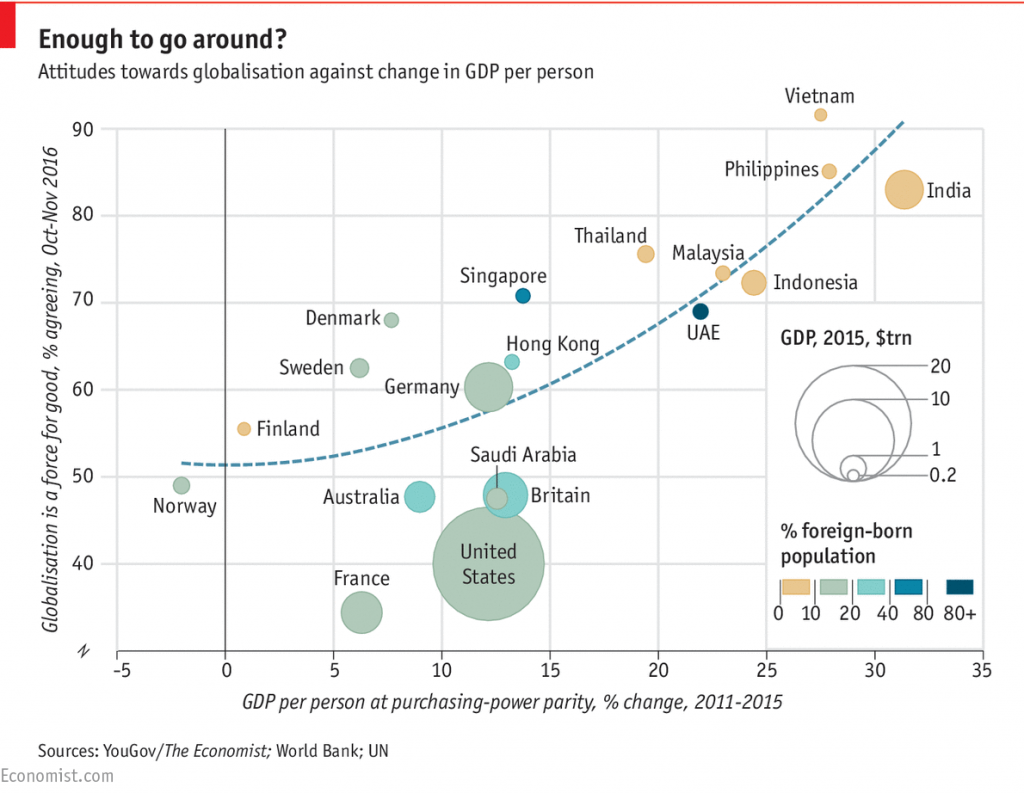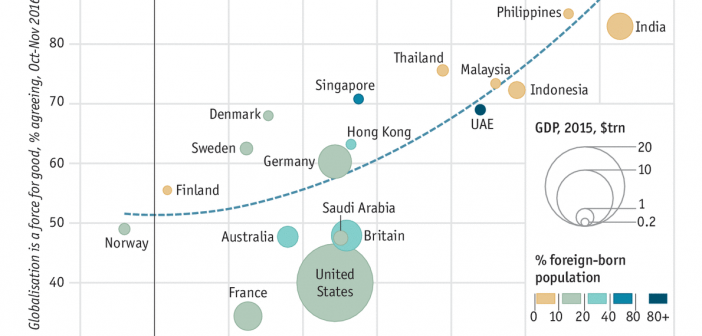
What the world thinks about globalisation
يبدو أن سيرورة العولمة تفقد زخمها بوصول الرئيس الامريكي الجديد ترامب الى الرئاسة الامريكية ، وتحول دول كانت منارة للانفتاح والديمقراطية مثل فرنسا الى القومية واليمين المتطرف . فما هي نظرة الرئيس الامريكي للعولمة ؟
وماهي نظرة أوروبا الأن للعولمة ؟
في المقالة او الدراسة المسحية لمجلة الايكونومسيت (أدناة ترجمة مختصرة جدا )مؤشرات سلبية جدا عن سيرورة العولمة من اهمها :
- أن اقل من نصف الامريكيين والبريطانيين والفرنسين يرون ان العولمة جيدة
- فرنسا تتحول الى القومية الضيقة .
- ترامب يريد لجم سيرورة العولمةمن خلال بناء الحواجز والأسوار والأسيجة والتهديد بلانسحاب من الاتفاقيات والمعاهدات الدولية مثل اتفاق باريس للاحتباس الحراري .
طبعا كل هذه الممارسات وغيرها تؤدي في النهاية الى لجم وعرقلة سيرورة العولمة وعودة القومية والعنصرية وهذا أمر لا يبشر بالخير للانسانية .
TWENTY-NINE years ago another American politician—Ronald Reagan—also sought to “make America great again”. He stood in front of the Brandenburg Gate in what was then West Berlin and implored his Soviet counterpart, Mikhail Gorbachev, to knock down the Berlin Wall. Mr Reagan proclaimed that the West was ready to “promote true openness, to tear down barriers that separate people, to create a safe, freer world”. Today Donald Trump is the politician most associated with the desire to make America great again—and he thinks the way to do so is to build walls. Unqualified defences of globalisation by Western leaders feel as archaic as the self-indulgent guitar solos of hair metal past.
We asked YouGov, a polling outfit, to survey 19 countries to gauge people’s attitudes towards immigration, trade and globalisation. The data reveal a split between emerging markets and the West, which is increasingly turning its back on globalisation. Beset by stagnant wage growth, less than half of respondents in America, Britain and France believe that globalisation is a “force for good” in the world. Westerners also say the world is getting worse. Even Americans, generally an optimistic lot, are feeling blue: just 11% believe the world has improved in the past year.
The turn towards nationalism is especially pronounced in France, the cradle of liberty. Some 52% of the French now believe that their economy should not have to rely on imports, and just 13% reckon that immigration has a positive effect on their country. France is divided as to whether or not multiculturalism is something to be embraced. Such findings will be music to the ears of Marine Le Pen, the leader of the National Front, France’s nationalist, Eurosceptic party. Current (and admittedly early) polling has her tied for first place in the 2017 French presidential race.
Hope for liberalism in the West now lies with the young. While millennials tend to hold more left-wing economic views, they are far keener on the idea of globalisation, broadly conceived, thanks to their more positive attitudes towards multiculturalism. In America, 46% of those aged 18-34 think that immigrants had a positive effect on their country, compared with just 35% of those aged 55 and over. In Britain the generational gap is even bigger: 53% and 22%, respectively. And millennials were more optimistic in every country surveyed, save for Indonesia.
The countries with the fastest-growing economies tend to be more positive about globalisation. The French, Australians, Norwegians and Americans tend to oppose the idea of foreigners buying indigenous companies. But most Asians do not see a problem. Few in Hong Kong and Singapore would argue that their city-states should be self-sufficient, whereas most respondents in Indonesia, Thailand, India, the Philippines and Malaysia reckon that their countries shouldn’t have to rely on imports.
Asian attitudes towards culture and immigration are nuanced: the Philippines, Vietnam and India are all overwhelmingly positive about the impact of immigration on society, but are at the same time sceptical of the benefits of multiculturalism. And, although respondents from these countries tend to believe that “globalisation has mostly benefited the wealthy”, they were also the most likely to respond that globalisation was a positive force.
In his 1989 essay, “The End of History?” Francis Fukuyama, a political theorist, argued that the great intellectual debate about liberalism had ended, and that all countries would gravitate towards liberal democracy. Although hemay still turn out to be right, he may have to wait a while for his vision to become reality
المصدر : مجلة الايكونوميست على الرابط :
http://www.economist.com/blogs/graphicdetail/2016/11/daily-cha.


